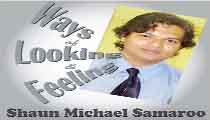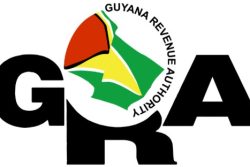Words shape space. This idea of space we tend to limit to the physical, but space includes the virtual and intangible, such as social space, and psychic, emotional and spiritual space.
The Internet created a whole new realm, a virtual space, alive and organic and full of energy.
Any virtual, intangible space lives inside language. While an animal in the wild stakes out its territory with physical marking out of its boundary, and guards such with care and cunning, us humans use the tool of language to design our social space, referring to this with the word “society”.
Society is therefore the social space we create, generate and design. The Guyanese nation is a social space, much more than a physical country. The concept that we make up a unique nation means that we build a society, a social space.
It’s fascinating to study this aspect of life, our use of language to build civilization. For example, the Internet 
So the idea that words shape space is a given. The words we think shape our cognitive, thinking space, and neurosurgeons have studied how words shape the development of the brain. That’s why we talk gently to babies. Harsh, violent talk to a baby would cause irreparable mental-health damage.
This idea of the value of words in designing our social space hits home with telling impact when we consider our rate of illiteracy.
Our illiteracy is really our inability to master our mother-tongue, the English language.
A people who refuse to read literate essays and stories, or cannot read, who, in other words, cannot increase their repertoire of vocabulary and deepen their reservoir of word-knowledge, that essential life tool for thinking, talking and sharing ideas and knowledge, cannot design a workable, efficient, sophisticated social space.
This, for example, is the simple difference between a home of educated people, of good readers, and a home of semi- or non-educated types.
One aspect of the developed world in North America, Europe and Asia that much of the under-developed world overlooks is this impact of language on society.
In Canada or the US or England, or anywhere in Europe, people talk well, forming structured sentences, and using an astonishing array of vocabulary, able to understand and self-express with efficiency and self-power.
This essential life skill, of using language with a high level of efficiency, cultivates two important skills for successful personal living: understanding and expression.
In school we learn these two skills as subjects, called Comprehension and Composition. But the Guyanese society fails today to incorporate comprehension and composition skills into daily living, as essential life skills.
Thus, one impact of our widespread illiteracy is that we harbour a society unable to comprehend its own reality, or understand itself, and to compose solutions, or express itself with introspective quality.
This is the kind of thing we’ve got to start talking about in this nation. Our media landscape gets caught in the social trap of this society of degenerated talk that lacks language efficiency, and so the problem perpetuates.
Once we recognize and accept that this simple formula offers us a long highway to the future of achieving the Guyana Dream, we’ve got to construct the pathway to accommodate the Guyanese citizen on this journey.
First, once we get the idea that words generate social space, or build society, we must develop tools to expand the national vocabulary, the words people use to think and talk.
Then, with the Guyanese citizen ready to step out in public full of the self-confidence of personal development, able to talk in well-formed sentences, skilled in understanding his or her environment and others, capable and experienced at thinking on his or her feet to be solutions-driven, in other words, to be creative in self-expression, then we proceed to generate a particular kind of social space as the Guyanese nation.
Today, we lack the insight of being a people who see possibilities. One might say we are not a people of possibility living. We see what’s wrong. We feel helpless and dependent, on Government, on the Diaspora’s remittance, on somebody giving us “a break”.
Were we to get the rich personal value of using words and language with skill, each of us personally, with authenticity and an open heart and a quest for goodwill, we would transform the Guyanese homeland.
We must learn to use words in a way that generates the kind of space that we want to see the Guyanese nation become. We want a social space across this nation whereby the citizen awakens to feel inspired, motivated, energized to build Guyana, using his or her initiative, personal development and talents and life-skills to make a difference in the world. That’s the kind of space we want to generate. That’s the kind of philosophy with which we must tackle this nation’s future.
Once we choose that we want to generate such a space, we then engage each other with one single-minded focus: what’s possible for the Guyanese nation in the 21st century?
Were we to sit at a round table and talk about what’s possible for us, were we to write a book on our possibilities, we would astound ourselves.
In this Knowledge Age, with the pastoral serenity of our land, with the natural resourcefulness of the Guyanese soul, with a global Guyanese population networked across the world, with our vast and rich mountains and rivers and magnificent farmlands, we harbour stunning potential, possibilities of greatness.
And all it takes is for us to develop our ability to use words and language to self-develop, and to design the social space that would engage in Guyanese possibilities, instead of cuss outs and frowning harshness and plosive non-thinking.
Our social space fails us today, and most Guyanese – 89 percent of us – who self-develop, inevitably seek to migrate. And, in migrating, the Guyanese move to a society where people invest energy in developing thinking and talking skills.






